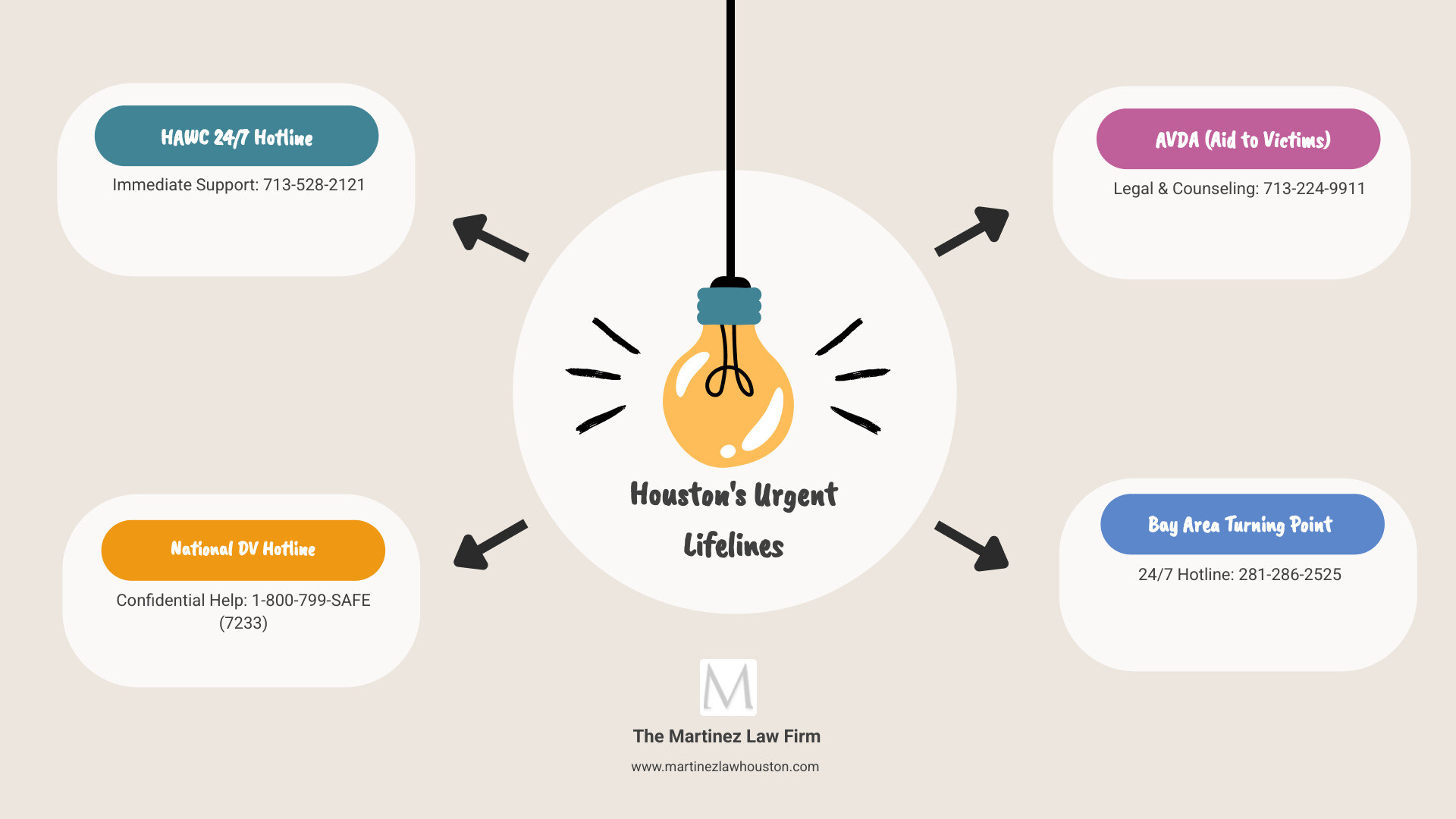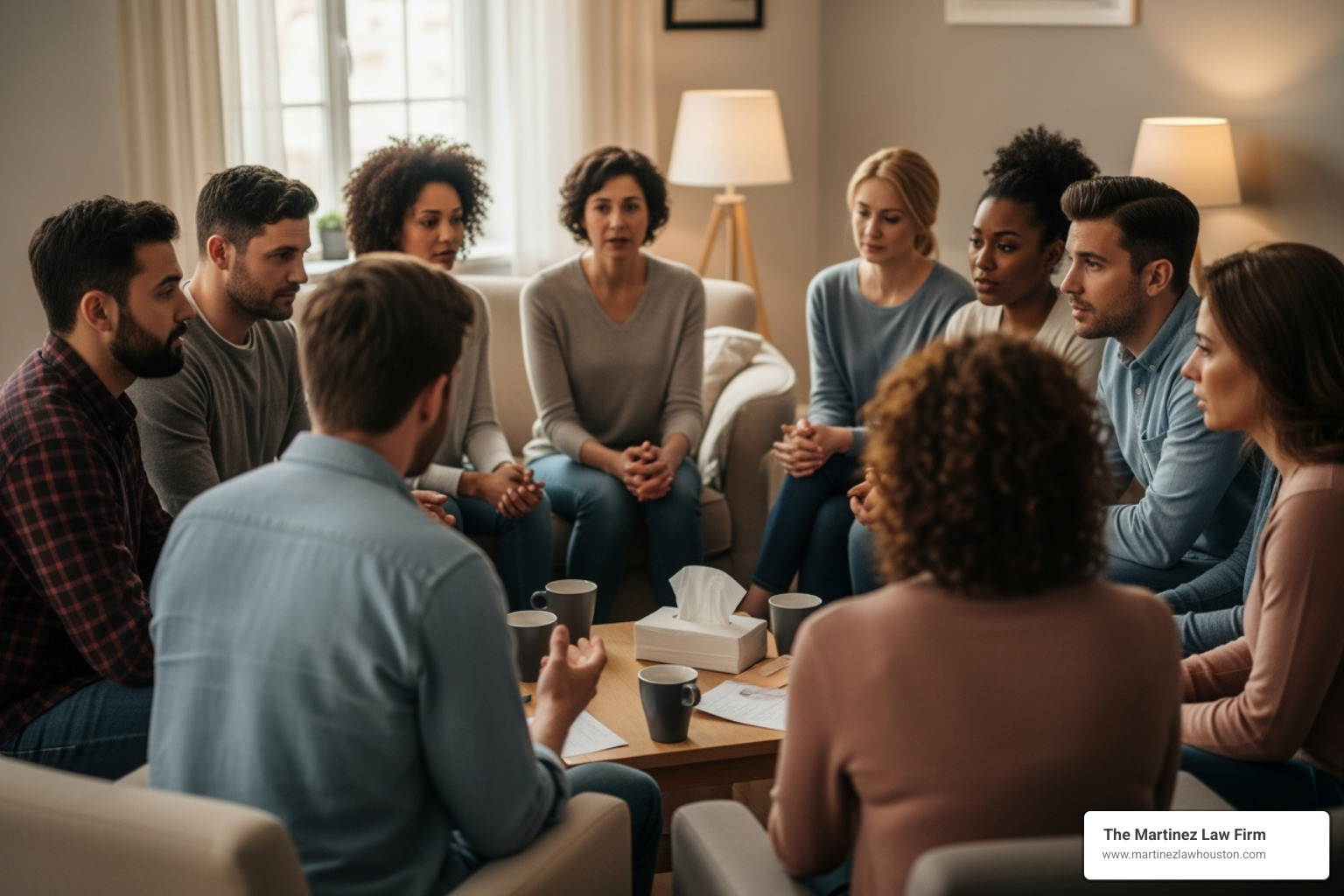Houston Domestic Violence Resources: Where to Find Help Now
Understanding Domestic Violence and Finding Help in Houston

If you’re searching for Houston domestic violence help, you’re not alone. Many resources exist to provide immediate safety and support. Here are some key contacts for urgent assistance:
- Houston Area Women’s Center (HAWC) 24/7 Hotline: 713-528-2121
- National Domestic Violence Hotline: 1-800-799-SAFE (7233)
- Aid to Victims of Domestic Abuse (AVDA): 713-224-9911 (for legal aid and counseling)
- Bay Area Turning Point (BATP) 24/7 Hotline: 281-286-2525
Domestic violence is a serious issue affecting countless lives. It’s not just physical abuse; it can include emotional, psychological, financial, and sexual abuse. These actions leave lasting scars, impacting victims, their children, and entire families.
Sadly, the statistics are stark: one in three women and one in ten men will experience domestic or sexual violence in their lifetime. In Houston, there are currently seven domestic violence shelters and programs, with four offering hotlines and emergency shelter.
This guide aims to shed light on these hidden struggles and connect you with the lifelines available. You deserve safety and peace.
As a criminal defense attorney and former prosecutor, I’ve seen the devastating effects of domestic violence and the urgent need for effective Houston domestic violence help. With more than 25 years in the courtroom, I offer a practical, informed perspective on navigating the justice system for those impacted.

Recognizing the Warning Signs of Domestic Violence
When we talk about domestic violence, we’re really talking about a pattern of harmful behaviors that one person uses to gain and keep power and control over another in an intimate relationship. It’s not always obvious, and it’s certainly not always physical.
Abuse can show up in many different forms, slowly chipping away at someone’s spirit and safety. Learning to spot these signs, whether for yourself or someone you care about, is the very first step toward finding safety and getting the Houston domestic violence help that’s available.
What are the common signs of an abusive relationship?
Abuse patterns rarely start with a bang. Often, they begin subtly and then escalate over time, becoming more frequent and severe. Here are some common warning signs that might indicate an abusive relationship:
Physical & Emotional Abuse
One of the most recognized forms is physical abuse. This can mean obvious acts like hitting, slapping, pushing, or kicking. But it can also include less visible harm, like denying someone medical care, preventing them from sleeping, or trapping them in a room.
Then there’s emotional and psychological abuse, which quietly eats away at a person’s self-worth and mental well-being. This might involve gaslighting, where an abuser makes you doubt your own sanity or memory, making you feel crazy. You might experience constant criticism and put-downs, where your achievements, appearance, or intelligence are regularly belittled.
Verbal Abuse
Threats are also a big red flag – threatening to harm you, your loved ones, pets, or even themselves. Abusers often resort to blaming the victim, shifting all responsibility for their bad behavior onto you. And sometimes, it’s just pure intimidation, using harsh looks, gestures, or shouting to instill fear.
Financial Abuse
Financial abuse is another powerful way to control someone, leaving them completely dependent. This can look like controlling all the money, denying you access to funds, or forcing you to account for every single penny you spend. It might also involve preventing you from working or going to school, or even running up debt in your name without your knowledge.
Social Abuse
Abusers frequently try to create isolation, cutting victims off from their support network. This often starts with extreme jealousy and possessiveness. They might constantly monitor your communication – checking your phone, texts, or emails – or outright prevent you from seeing friends, family, or even going to work. This leaves you feeling alone and more reliant on them.
In our modern world, abuse has extended into the digital space, known as digital abuse. This includes harassing you endlessly via text, email, or social media. It can also involve tracking your location without your consent or, terrifyingly, sharing intimate photos or videos of you without your permission.
Finally, there’s stalking, which is persistent and unwanted attention that makes you fear for your safety. This could mean following you, showing up unannounced at your home or workplace, or sending unwanted gifts. Abusers also often display unpredictability, having extreme mood swings that leave you constantly “walking on eggshells,” unsure of what will trigger their next outburst.
Recognizing these patterns is incredibly important. If you suspect someone you know is experiencing domestic violence, offering a supportive ear and connecting them to resources can be life-saving. For more information on the legal aspects of physical harm, you can read our article about More info about Assault.
Immediate Crisis? Houston’s 24/7 Emergency Hotlines
When you’re facing an immediate crisis, knowing exactly who to call can truly change everything. Hotlines are more than just phone numbers; they’re lifelines. They offer a safe space for confidential support, help you make a safety plan, and quickly connect you with vital resources. If you are in immediate danger, your first call should always be to 911.

These hotlines are specifically set up to be available for you 24/7. This means help is always just a call away, day or night, and often with support in multiple languages. You don’t have to face this alone.
National and State-Wide Hotlines
Beyond our local Houston resources, there are fantastic national and state-level hotlines ready to offer crucial support, no matter where you are in Texas.
First, there’s the National Domestic Violence Hotline. This incredible resource is the only 24/7 center in the entire nation that can connect you directly with service providers and shelters. You can reach them by calling 1-800-799-SAFE (7233), or by visiting their website at The National Domestic Violence Hotline. They even offer convenient text and chat options if talking on the phone isn’t safe or comfortable for you.
For support specifically within Texas, the Texas Council on Family Violence is a vital organization working to end family violence across the state. While they don’t operate a direct hotline for victims, they are a powerful advocate and can guide you to many local resources. You can also text BEGIN to 88788 for Texas-specific support.
If you’ve experienced sexual assault, the Rape, Abuse, & Incest National Network (RAINN) National Hotline is there for you at 1-800-656-HOPE (4673), or you can find more information at www.rainn.org.
And if you ever suspect a child is being abused, please reach out to the Childhelp National Child Abuse Hotline at 1-800-422-4453 or visit www.childhelp.org. Their compassionate crisis counselors are available 24/7 and can assist in over 170 languages. Similarly, for reporting child or adult abuse in Texas, you can call the Child & Adult Protective Services Hotline (Texas) at 1-800-252-5400 or visit www.dfps.state.tx.us/contact_us.
Key Houston-Area Emergency Hotlines
When you need specific Houston domestic violence help, our local community steps up with dedicated hotlines right here in your backyard:
- The Houston Area Women’s Center (HAWC) is a cornerstone of support. Their domestic violence hotline is 713-528-2121. They also run a sexual assault hotline at 713-528-7273 and have a TTY line at 346-295-8994. HAWC is renowned for its free, confidential, 24/7 support services.
- The Bridge Over Troubled Waters offers a 24-hour hotline at 713-473-2801. They provide crucial services like residential shelter and counseling to those in need.
- For those in the Bay Area, Bay Area Turning Point (BATP) has a 24/7 hotline at 281-286-2525. They are a safe haven, offering emergency shelter for battered women and children, along with confidential support. You can explore more about their services at www.bayareaturningpoint.org.
- Serving Fort Bend County, the Fort Bend Women’s Center (FBWC) hotline is 281-342-HELP (4357). Their mission is to empower survivors to achieve safety and build a path towards self-sufficiency.
- For residents of Montgomery County, the Montgomery County Women’s Center (MCWC) provides a 24-hour hotline at 936-441-7273. They offer immediate crisis intervention, counseling, safe shelter, and important legal advocacy.
- Finally, Family Time Crisis & Counseling Center, located in Humble, runs a safe shelter hotline at 281-446-2615. They provide counseling and help connect shelter residents with further resources.
These hotlines are truly your very first point of contact for getting immediate safety planning, emotional support, and connecting with a wide array of services designed just for you.
Finding Safe Harbor: A Guide to Houston Domestic Violence Help
Once the immediate crisis has passed, a deeper journey begins: one of healing, rebuilding, and finding lasting safety. Thankfully, Houston is home to a robust network of organizations dedicated to offering comprehensive, free, and confidential support. These incredible resources are here to empower survivors like you, helping you reclaim your life and find peace.
Think of it as finding your “safe harbor” – a place where you can access the vital services you need. This often includes emergency shelter, compassionate counseling, and crucial legal assistance, all designed with survivor empowerment at their heart. Every step of the way, these organizations provide invaluable Houston domestic violence help.
Emergency Shelters and Transitional Housing
When you’re fleeing a dangerous situation, finding a safe place to rest your head is paramount. Houston’s emergency shelters are more than just a roof over your head; they are true safe havens. They offer immediate relief, allowing you to breathe, think, and start planning your next steps in a secure environment. Many also provide transitional housing, helping you bridge the gap to a more permanent, independent living situation.
Organizations like the Houston Area Women’s Center (HAWC) offer both emergency shelter and transitional housing, complete with counseling and other vital support services. The Bridge Over Troubled Waters provides a nurturing, family-like residential shelter for women and children, focusing on counseling and education to help them move forward. You can also find emergency shelter for battered women and children at Bay Area Turning Point. Their website, www.bayareaturningpoint.org, offers more information on their crucial services.
For families, Family Time Crisis & Counseling Center offers safe shelter for battered women and children (including boys up to age 14), providing counseling and referrals. Even organizations like Salvation Army Sally’s House, Star of Hope Mission, Mission of Yahweh, and Catholic Charities, while not exclusively domestic violence shelters, often serve as temporary refuges for those escaping abusive situations, offering general homeless and family shelter services. These places provide the breathing room and safety needed to begin the healing process.
Counseling and Emotional Support Services
Healing from the trauma of domestic violence is a unique and often long journey, but you don’t have to walk it alone. Emotional support and professional guidance are key to processing the past and building a stronger future. Many wonderful organizations offer counseling and therapeutic services for survivors, and often for their children too.
AVDA (Aid to Victims of Domestic Abuse), for instance, provides free trauma counseling for adults and children (ages 12 and up). Their mission is all about ending family violence through advocacy and community support. You can reach them at 713-224-9911. Similarly, FamilyTime Crisis & Counseling Center offers free counseling to victims of family violence in Texas, complementing their shelter services. You can also find support at places like Innovative Alternatives and Center for Counseling in Houston.
The Houston Area Women’s Center (HAWC) includes counseling for domestic violence survivors as a core part of their comprehensive services. And remember, many of the shelters we mentioned, such as The Bridge Over Troubled Waters, Bay Area Turning Point, and Montgomery County Women’s Center, integrate counseling directly into their programs. These services are vital for processing trauma, developing healthy coping mechanisms, and rebuilding self-esteem, setting you firmly on the path toward independence and well-being.
Legal Houston domestic violence help: Navigating Your Rights
Navigating the legal system can feel overwhelming, especially when you’re healing from trauma. But having the right legal assistance is absolutely crucial for securing your safety and seeking justice. Thankfully, many organizations offer free or low-cost legal aid, providing essential Houston domestic violence help.
AVDA (Aid to Victims of Domestic Abuse) is a fantastic resource, offering free legal representation and other services to domestic violence victims in Harris and Fort Bend counties. They can help with protective orders, divorce proceedings, child support, and custody, regardless of your citizenship status.
For those with low incomes, Houston Volunteer Lawyers provides pro bono civil legal services, including family law, in Harris County. You can contact them at 713-228-0735 or visit www.makejusticehappen.org. Another great option is Lone Star Legal Aid Foundation, which offers civil legal services to low-income individuals and families, including assistance with domestic violence cases. Their Houston office is at 713-652-0077, or you can visit www.lonestarlegal.org.
Texas Advocacy Project (TAP) offers free legal and social services specifically for survivors of intimate partner violence, sexual assault, stalking, human trafficking, and child abuse across Texas. They’re unique because they have no restrictions or waitlists – just call 800-374-HOPE or visit www.texasadvocacyproject.org. And for general legal information, referrals, and even emotional support via email, WomensLaw.org is a valuable online resource at https://www.womenslaw.org/.
Understanding your legal rights, seeking protective orders, having legal representation in court, or getting help with divorce and child custody can be powerful steps toward securing your safety and building a new, independent life. For a deeper dive into the legal implications and how we can help, we encourage you to visit our page on Houston Domestic Violence legal information.
Specialized Resources for Every Survivor in Houston
Domestic violence doesn’t discriminate, and neither should the support available to survivors. In Houston, we’re incredibly fortunate to have a rich mix of organizations dedicated to providing Houston domestic violence help that’s truly inclusive.
These groups understand that every survivor’s journey is unique, and they work hard to offer support that feels right for diverse communities. It’s essential that every survivor feels seen, heard, and understood, no matter their background.

Support for LGBTQ+ Individuals
For our LGBTQ+ friends and neighbors, experiencing domestic violence can come with an added layer of challenges. Issues like homophobia, transphobia, and societal stigma can make it even harder to reach out for help. Thankfully, Houston offers wonderful resources that provide affirming and inclusive support.
The Montrose Center is a shining example, offering rental living spaces, resources, and programs specifically for local lesbian, gay, bisexual, and transgender people and their loved ones. You can reach their main line at 713-529-0037, and they even have an LGBT Switchboard 24-Hour Hotline (supporting survivors of sexual assault) at 713-529-3211. Another powerful ally is AVP (Anti-Violence Project), which works to empower LGBTQ+ and HIV-affected communities. They help end all forms of violence and provide crucial support to survivors through counseling and advocacy. You can learn more about their vital work at https://avp.org/get-help/. These organizations truly understand the specific dynamics of abuse within LGBTQ+ relationships and offer safe, welcoming spaces.
Culturally-Specific Houston domestic violence help
We know that language and cultural differences can sometimes be barriers when seeking help. That’s why Houston is home to incredible organizations that offer culturally sensitive and language-specific Houston domestic violence help. They ensure that survivors receive support that respects their heritage and is delivered in a way that feels comfortable and familiar.
For instance, DAYA focuses specifically on the South Asian community in Houston, providing legal, intervention, and financial assistance to victims of domestic violence. You can contact them at 713-981-7645 or visit www.dayahouston.org. Similarly, Asians Against Domestic Abuse (AADA) offers culturally sensitive and language-specific services to victims from the broader Asian community in Houston.
For our Hispanic community, Community Family Centers provides services in Spanish, ensuring that language is never a hurdle to finding help. Their number is 713-923-2316, and their website is www.communityfamilycenters.org. While not exclusive to Houston, WomanKind also offers a highly trained helpline with advocates who speak English, Spanish, and over 18 Asian languages and dialects, including Chinese, Korean, Japanese, and Tagalog. This can be an invaluable resource for Houston’s incredibly diverse population.
Resources for Immigrants and Undocumented Survivors
Immigrant survivors often face unique and daunting challenges, such as fear of deportation, language barriers, and simply not knowing their rights. Thankfully, several Houston organizations offer vital support to these individuals, often regardless of their citizenship status. They understand that safety should be accessible to everyone.
Catholic Charities offers an excellent Immigrant Legal Assistance program in Houston, reachable at 713-595-4100. They provide legal assistance to immigrants, including those who are victims of domestic violence, helping with important processes like petitions for U.S. residency under the Violence Against Women Act (VAWA) and U-Visas.
Another fantastic resource is YMCA International Services. They offer counseling and legal representation to individuals seeking immigration assistance, including asylum seekers and victims of domestic violence or human trafficking. You can reach them at 713-339-9015 or visit https://ymcahouston.org/locations/ymca-international-services/programs.
And as we mentioned earlier, AVDA (Aid to Victims of Domestic Abuse) proudly extends its services to all victims of domestic violence in Harris and Fort Bend counties, regardless of their citizenship status. These resources are truly vital, helping immigrant survivors safely leave abusive situations without the added fear of legal repercussions related to their immigration status.
The Role of Law Enforcement and the Justice System
When you’re facing domestic violence, the idea of involving the police or going to court can feel incredibly overwhelming. But know this: law enforcement and the justice system are here to help protect you, respond to immediate danger, and hold offenders accountable. At The Martinez Law Firm, we deeply understand how these systems work, especially when it comes to Houston domestic violence help and legal proceedings.

Law Enforcement Support
Often, after reaching out to a crisis hotline, law enforcement becomes your next crucial point of contact. They’re not just there to react; their role is vital for your immediate safety and for gathering the evidence needed to help your case.
In Houston, the Houston Police Department (HPD) Family Violence Unit is specially trained to handle domestic violence incidents within city limits. They respond to calls, gather important evidence, help file charges, and can even offer short-term crisis support. You can reach them at 713-308-1100 or learn more at www.houstontx.gov.
If you’re outside Houston city limits but still within Harris County, the Harris County Sheriff’s Office Special Victims Division provides similar crucial support. They assist victims of domestic violence, sexual assault, and child abuse, and can be reached at 713-274-9164.
Beyond HPD and the Harris County Sheriff’s Office, many local police departments throughout the greater Houston area are ready to respond to domestic violence calls within their specific areas. This includes departments like Pasadena P.D. (713-477-1221), La Porte P.D. (281-471-2141), Deer Park P.D. (281-478-2000), South Houston P.D. (713-944-1910), Galena Park P.D. (713-675-3471), and Jacinto City P.D. (713-672-2455).
These law enforcement agencies can also issue emergency protective orders right away and connect victims with further support services, making them a crucial link in the chain of Houston domestic violence help.
The District Attorney’s Office and Legal Proceedings
Once law enforcement steps in, the District Attorney’s Office takes over a vital role. Their job is to prosecute domestic violence cases, seeking justice for victims. Many of these offices even have special units and dedicated victim advocates to help you through the process.
In Harris County, the Harris County District Attorney (Family Law Division) has a dedicated Domestic Violence Division (713-274-0211). This specialized team handles cases involving intimate partner violence, elder abuse, and even animal cruelty.
They have specially trained prosecutors, social workers, and support staff, and can represent individuals seeking protective orders completely free of charge. You can find more information at www.app.dao.hctx.net.
Similarly, the Fort Bend County District Attorney’s Office and Montgomery County District Attorney’s Office also have victim services divisions. These divisions work closely with law enforcement and victims to prosecute domestic violence cases effectively.
Navigating the court process can be confusing, but these offices are there to guide you. They also help victims understand their rights and what to expect from the legal system, including nuances like Understanding Probation Violations if those become part of your case.
Your Path to Healing and Hope
We’ve covered a lot of ground in this guide, exploring the many paths to Houston domestic violence help. From the first brave step of recognizing the signs of abuse to finding immediate safety and long-term support, Houston offers a network of caring individuals and organizations ready to stand by your side.
It’s clear that you are not alone. Whether it’s a 24/7 hotline, a safe emergency shelter, compassionate counseling, or crucial legal aid, resources are here. We’ve also seen how vital specialized support is for our diverse communities, including LGBTQ+ individuals, those from various cultural backgrounds, and immigrant survivors. Every person deserves help that truly understands their unique situation.
The courage of survivors shines brightly, and the dedication of these organizations shows us that domestic violence can be stopped. It takes a community working together. Your awareness, support, and willingness to share this information can help strengthen these lifelines for countless others.
At The Martinez Law Firm, we understand how deeply domestic violence affects lives. While our main focus is criminal defense, we strongly believe in empowering everyone with knowledge about the resources available right here in our community. We want you to understand your rights and know that there’s a path forward.
If you or someone you know needs legal guidance related to a domestic violence case – whether you’re a victim looking to steer the legal system or someone facing accusations – please don’t hesitate to reach out. We are here to help you understand your options and guide you through the legal process.
Contact us for a consultation on your domestic violence case

